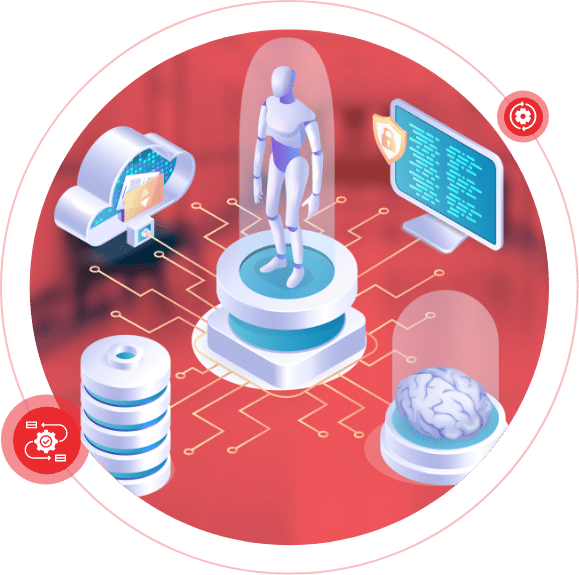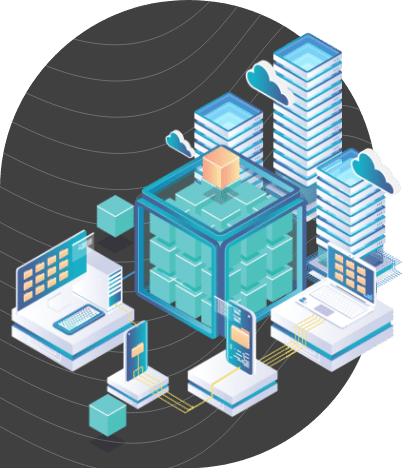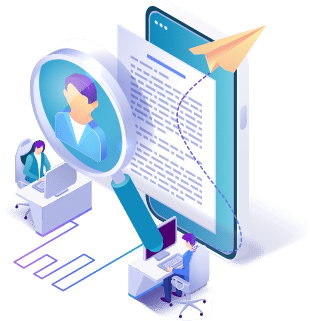

Robotic Process Automation Solutions
Harness the power of robotic process automation (RPA) to empower your team to develop intelligent workflows in hours, not days or weeks. Gain one of the most versatile and proven RPA solutions in today’s market.
Ready to learn more? Contact our team today to discover the transformative power of SST from Consensus.
Required *

Overview
Robotic process automation technology mirrors human interactions with software to streamline repetitive tasks. With over 20 years of experience providing RPA solutions to the healthcare sector, Consensus Cloud Solutions is an RPA pioneer. Our reliable and cost-effective SST solution builds on our legacy of innovation, delivering more value and return on investment (ROI) with each release. With SST, your team can reduce the time it takes to build custom workflows for your organization, boosting productivity and cutting costs.
The Power of Robotic Process Automation
RPA can partially or fully automate certain repetitive or rules-based activities that humans may perform in the workplace. In other words, RPA can eliminate some tedious, manual tasks that many employees dread and free them up to focus on higher-value or more engaging work.
It’s important to note that RPA doesn’t involve the use of mechanical robots like those you might find on a factory assembly line. Instead, it utilizes software-based robots (or “bots”) to complete specific tasks.
You’ll find varying definitions of RPA, but experts agree that RPA has the following core elements:
- Using robotic applications to perform repetitive, high-volume tasks in a work environment.
- Deploying computer vision (CV), machine learning (ML) and natural language processing (NLP) to execute tasks.
- The employment of triggers or rules that initiate the action the robotic applications perform.
By deploying RPA, you can replace certain labor-intensive tasks, such as data entry or transaction processing. Additionally, RPA can handle some straightforward customer service tasks. In fact, many of the chatbots used on today’s websites are RPA tools that address simple queries, such as directing visitors to the correct web page to find information.
While RPA has focused primarily on structured datasets to date, combining RPA with artificial intelligence (AI) opens new possibilities to analyze and act on unstructured data. As RPA tools grow in sophistication, they can start to take on more complex tasks, such as analyzing sentiment to recommend actions to resolve customer issues.
This evolution is a game-changer. Without question, RPA can bring increasing productivity gains to organizations as RPA technology advances.
Benefits
Improved Productivity
Many employees perform repetitive manual tasks as part of their jobs. Imagine how much more productive those team members—and your organization—could be by eliminating these mind-numbing tasks. RPA can eliminate significant manual work, ensuring necessary activities get done without burdening your team. Instead, your employees can focus on more engaging, productive work—serving customers, closing sales or developing innovative new products or services.
Reduced Errors
Let’s face it: Even the best employees make mistakes. Performing the same tedious work day after day only increases the possibility of human error. For example, if team members must copy data from one system to another every day, they’ll likely introduce some mistakes. Even a minor typo or two transposed numbers can create big issues with reporting, financial projections, billing or customer service. With RPA, you can eliminate those errors and see significant improvements in data accuracy and quality.

Higher Customer Satisfaction
Today’s customers have extremely high expectations. They’re used to receiving seamless service from customer experience leaders who have set a high bar. If you don’t meet their needs for efficiency and quality service, you risk losing them to competitors. With RPA, you can automate some online customer support functions to help people find the answers they need quickly. Plus, RPA can operate 24/7, so your customers can reach you anytime.
Reduced Costs
Not operating efficiently adds cost to your bottom line. Every time an employee makes a preventable error and needs to research to correct it, there’s a cost. Every call to your support team to resolve a question that’s easily answered online creates more cost. Hiring someone to perform tedious, repetitive manual data entry is yet another cost. These are just a few examples of the types of expenses you can reduce or eliminate with RPA.
Improved Compliance
Many industries must meet stringent regulatory mandates, which typically require detailed record-keeping and reporting. Any missteps in these processes can cause significant fines, increased regulatory scrutiny and harm to your reputation. If you rely on traditional, manual approaches, you may find that your records are full of preventable errors. However, deploying RPA can help you keep thorough, accurate and error-free records so that you can meet compliance mandates and any audits with confidence.
Reduced Coding
Organizations may recognize the powerful benefits of automated workflows but lack the technical expertise or time to develop them. With low-code RPA solutions, anyone on your team can create workflows that map to your business processes with ease. Your expert developers won’t have to spend hours or days writing and testing custom code. RPA solutions that offer intuitive, drag-and-drop capabilities simplify the workflow development process so that you can introduce new efficiencies quickly.
SST
Designed with the exclusive needs of today’s complex healthcare organizations in mind, SST is an industry-leading RPA solution. RPA makes workflow development simple, saving hours of time and letting healthcare organizations revisit processes as their organization evolves.
With SST, you can unlock the power of RPA to simplify many of the daily clinical, administrative and revenue cycle management (RCM) tasks your team performs every day, including:
- Patient registration and scheduling
- Patient account updates
- Dictionary updates
- System migrations, upgrades and testing
- Invoicing and payment processing
- Collections record keeping
- Billing data entry
- Remittance posting
- Payroll updates
A vendor-agnostic solution, SST interfaces with all electronic health records (EHR) systems, including MEDITECH, Allscripts, EPIC, Cerner and others. This capability takes the pain out of system replacements, conversions or migrations, allowing your team to become more productive more quickly.
With SST, you also gain code-free automation and point-and-click workflow creation, which benefits both programmers and non-programmers. The straightforward SST implementation process lets you get up and running in minutes so you can start automating manual tasks and enhancing your operational efficiency right away. SST empowers you to automate any process in any environment and lets you reuse workflow segments to simplify and streamline new workflow designs.
Another advantage of SST is that it works 365/24/7. Routine tasks can happen automatically, without human oversight or intervention, completing projects in a fraction of the time it would take an employee to do the same jobs. Plus, SST can handle a wide range of tasks your organization performs every day, such as:
- Filling in forms
- Extracting data from documents
- Moving files or folders to new locations
- Transferring and analyzing data
- Entering data into spreadsheets or systems
- Generating reports
Instead of wasting time and energy on tedious manual work, your team members can take on new activities that grow their skills and deliver more value to your organization. This is a win for everyone.
Case Studies
Surgery Partners
A large, geographically dispersed organization supporting over 170 hospitals, Surgery Partners has a presence in 32 states. With hospitals running diverse MEDITECH instances, Surgery Partners wanted a vendor-agnostic RPA solution to support these platforms, along with the other EHR systems used across its sites. Additionally, Surgery Partners wanted to reduce the administrative burden on its team members by employing RPA to eliminate repetitive, manual work.
Surgery Partners chose the SST workflow automation platform to streamline and reinvent processes. As a first step, teams looked for opportunities to improve ROI and gain efficiency with RPA, with a specific focus on redundant tasks that automation could improve. With SST, Surgery Partners was able to implement workflows across varied MEDITECH platforms without needing to rebuild them multiple times. Automation could run automatically, with built-in triggers tied to dates, actions and other cues, with little to no human intervention required.
St. Claire Healthcare
A Kentucky-based non-profit healthcare system, St. Claire Healthcare, found that its team was spending significant time making manual updates to its MEDITECH system. Additionally, the organizations faced the challenge of mass directory updates and builds, along with claim delays of more than $2 million caused by slow account verification processes. St. Claire knew these issues would take weeks to months for its team to resolve, leading to increased stress and burnout.
Knowing that a better way was possible, St. Claire turned to SST to create RPA workflows to simplify its processes and reduce the administrative burden on staff. Not only did St. Claire benefit from proven technology, but the organization also relied on expert consulting to reimagine workflows to align with its business needs. St. Claire established clear ROI tracking for its SST project and achieved measurable cost and time savings, along with improved usability and enhanced data reliability. Increases in billed accounts and productivity improvements have delivered financial wins for the organization.
Robotic Process Automation for Industries
SST has delivered the proven benefits of RPA to top-name healthcare organizations for decades. Beyond healthcare, the power of RPA has broad applicability across multiple industries.
Here are a few examples:
Finance and Accounting

Retail
Competition for retail customers is fierce, so retailers must optimize their operations to deliver the best experiences. By implementing RPA, retailers can provide personalized digital interactions that recommend products or present customized offers to customers. RPA can also support inventory management by monitoring stock availability and triggering stock replenishment when supplies are low. Plus, RPA can automate repetitive tasks, such as data entry, order tracking and others, allowing retailers to free up teams to focus on higher-value work.
Manufacturing
RPA can be a true game-changer for manufacturers. With RPA, manufacturers can streamline essential production tasks, such as quality control, material handling and packaging. Also, manufacturers can use RPA to monitor sensors on factory equipment to know if maintenance or repairs are necessary and handle them proactively to prevent downtimes. Using RPA, manufacturers can shorten the time required to produce goods, delivering more quickly to customers and increasing revenues.
Next Steps
Is your organization ready to explore the transformative power of RPA? If so, you can contact us to learn more about our SST solution. Gain a partner who brings deep industry and RPA knowledge and an unmatched commitment to service to every engagement.

Put RPA to Work for Your Organization
The pace of change in today’s digital world isn’t going to slow down. To keep up, you need SST, an advanced RPA solution that automates repetitive tasks and streamlines your workflows. With SST, you can set your team free from the tedious, manual work that often causes burnout and frustration. Your organization benefits from increased data accuracy and quality, a more engaged workforce, happier customers and enhanced efficiency.
With a decades-deep legacy of success in the healthcare industry, SST is the RPA solution of choice for many healthcare leaders. You can keep critical records up-to-date to meet regulatory compliance mandates without requiring staff to spend hours daily on manual data entry. The cost-savings and ROI you can gain from implementing SST can improve your bottom line today and create a foundation for long-term financial success.